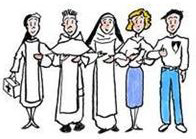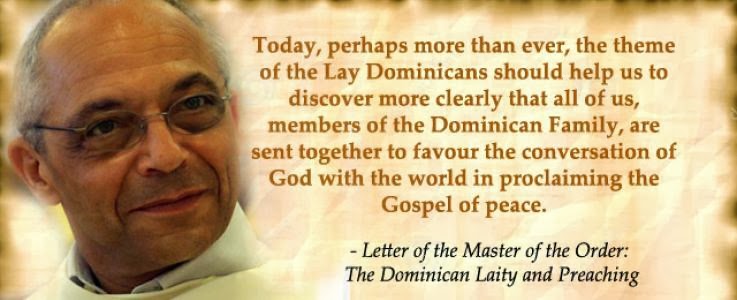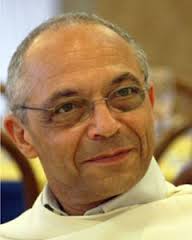At the end of 2013, the Master of the Order, Bruno Cadoré, wrote a letter to the Dominican family entitled ‘The Dominican Laity and Preaching‘. He recalls the decision of the friars to give as the theme for the celebration of the Jubilee this motto, ‘as simple as it is radical: “Sent to preach the Gospel”, echoing the sending forth of the first friars as preachers at the service of the Church, totally devoted to evangelising the Word of God.
‘This motto is simple in that it centres our attention on what is at the heart of the service that the Church expects of the Order: to proclaim the Gospel. It is radical, because, beyond all the difficulties that may be encountered, beyond the uncertainties that may inhabit us as to what we must be or do, it reminds us that first and foremost we must be open to this “sending forth” from which we take our identity. Today, perhaps more than ever, the theme of the Lay Dominicans should help us to discover more clearly that all of us, members of the Dominican Family, are sent together to favour the conversation of God with the world in proclaiming the Gospel of peace.
[…] ‘If it is quite clear that things have changed since the time of the beginnings of the Order, we are also very often sensitive to certain analogies that cannot fail to remind us of what for Diego and Dominic lit the fire of preaching: changes in the way the Church was living as a result of the changes in feudal society, the emergence of new knowledge and new ways of obtaining it, profound changes in the organisation of society and of cities. At the heart of these changes, groups of lay people arose who invited the Church to act, to dare to venture outside structures that were too firmly established and too rigid so as to risk suffocating the widespread breath of life. These “poor”, “humble” people made the choice of a life that offered a humble presence in the world, an authentic, living word preached as good news, and a certain radicalism in their way of life. They were moved by this intuition, that radicalism lived in full humanity because of the Gospel was the best way to “interpret” the Word and to make manifest the presence of the One who comes to save the world. Some of these groups of lay people were even given, by Pope Innocent III, the possibility to undertake itinerant, mendicant preaching. The “Third Orders” of mendicants were in one way or another the heirs of these movements. And it is in this ferment of a Church that was seeking to rediscover the vigour of its authenticity that the “Holy Preaching of Prouilhe” arose, when some lay people came to take part in Dominic’s adventure in its very infancy. Rereading these earliest times, I cannot help thinking that, when he received the first sister converts who had come to put themselves under his protection, then Ermengarde Godoline and her husband, Sanche Gasc (8 August 1207), Dominic began to dream of this adventure as modelled on the group of which St Luke speaks in his Gospel, the group who accompanied Jesus, going “through cities and villages, proclaiming and bringing the good news of the kingdom of God” (Luke 8:1-3). This short passage from Luke’s Gospel describing Jesus the preacher is at the heart of the account in Chapters 7 to 10, in the light of which we can rejoice that we are, in our tum, “sent to preach the Gospel” on the model of fraternity. Further to the “holy preaching”, we are sent as a family to preach the Gospel. The idea of the “Dominican family” is thus not just a way of expressing the coming together of several groups with a single purpose. It also expresses a way of evangelising and, from this point of view, lay Dominicans are a reminder of this requirement, rooted in the Gospel.
 ‘The unity of our Order is in fact given by its evangelising mission: laity, sisters and friars of the Order are members of a single family whose identity is that they are sent to preach the Gospel. Or rather, we might say that the “Dominican” identity is precisely that of a family – of a “communion” – constituted by this organic bond between evangelisation and the contemplation of that truth that is the living Word that has come into the world, what we try to develop in the three forms of prayer, study and fraternity, each in the specific manner of her/his state in life. In Luke’s Gospel quoted above, the sending forth of the twelve, then of the seventy-two, falls into this dynamic in which Jesus is revealed as the Word that fulfils the promise and gives life, the Word that must be heeded and put into practice, this Word that brings brothers and sisters together. In commending the Preachers, Pope Honorius presented them as totally dedicated to the evangelisation of the Word of God. This consecration to the Word, to preaching and to contemplation (“sanctify them in the truth: your Word is truth”, John 17:17), is what makes our unity. In this perspective, the dimension of the unity of the Dominican family is essential because it is linked to the mission of preaching the Kingdom (the continuation of the Son’s prayer to the Father, in the Gospel according to St John, explicitly evokes the sending forth into the world and asks that they may be one: John 17:18-23). It is obvious that the Order of Preachers does not have the monopoly of preaching or of evangelisation in the Church, but it seems to me that its “confirmation” for almost 800 years ordains it, as “holy preaching”, to serve the charism of preaching in the Church: in other words, to serve this essential dimension of the Church according to which this charism is constituted, established by the grace of the Spirit of Christ. This service does not take only the form of the act of preaching or evangelisation, but much more, because of the constitution of a family united in order to preach, it is a reminder to the heart of the Church that evangelisation contributes to establish the Church as fraternity and communion.
‘The unity of our Order is in fact given by its evangelising mission: laity, sisters and friars of the Order are members of a single family whose identity is that they are sent to preach the Gospel. Or rather, we might say that the “Dominican” identity is precisely that of a family – of a “communion” – constituted by this organic bond between evangelisation and the contemplation of that truth that is the living Word that has come into the world, what we try to develop in the three forms of prayer, study and fraternity, each in the specific manner of her/his state in life. In Luke’s Gospel quoted above, the sending forth of the twelve, then of the seventy-two, falls into this dynamic in which Jesus is revealed as the Word that fulfils the promise and gives life, the Word that must be heeded and put into practice, this Word that brings brothers and sisters together. In commending the Preachers, Pope Honorius presented them as totally dedicated to the evangelisation of the Word of God. This consecration to the Word, to preaching and to contemplation (“sanctify them in the truth: your Word is truth”, John 17:17), is what makes our unity. In this perspective, the dimension of the unity of the Dominican family is essential because it is linked to the mission of preaching the Kingdom (the continuation of the Son’s prayer to the Father, in the Gospel according to St John, explicitly evokes the sending forth into the world and asks that they may be one: John 17:18-23). It is obvious that the Order of Preachers does not have the monopoly of preaching or of evangelisation in the Church, but it seems to me that its “confirmation” for almost 800 years ordains it, as “holy preaching”, to serve the charism of preaching in the Church: in other words, to serve this essential dimension of the Church according to which this charism is constituted, established by the grace of the Spirit of Christ. This service does not take only the form of the act of preaching or evangelisation, but much more, because of the constitution of a family united in order to preach, it is a reminder to the heart of the Church that evangelisation contributes to establish the Church as fraternity and communion.
Excerpt from ‘The Dominican Laity and Preaching’

